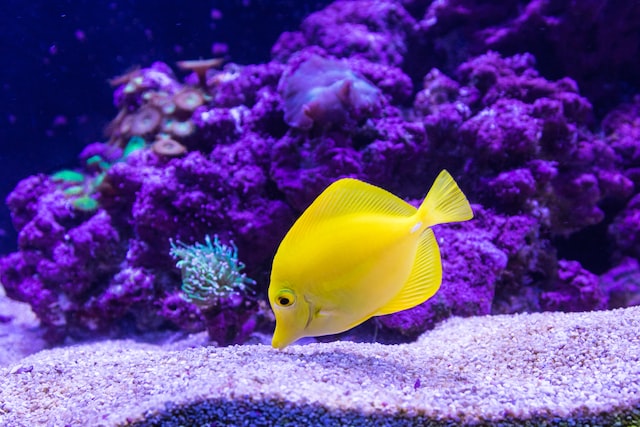Introduction
Choosing the right aquarium gravel is an important step in setting up your fish tank. Not only can gravel add to the aesthetic of your tank, but it also helps to keep your fish and plants healthy. In this blog post, we’ll explore the different types of aquarium gravel, the factors you should consider when choosing it, and the benefits of using it. We’ll also cover best practices for installing it, as well as troubleshooting tips for aquarium gravel. With our helpful tips, you can make the perfect choice for your aquarium.
Understanding Different Types of Aquarium Gravel
When it comes to aquariums, one of the most important elements is the gravel. It’s not only a decorative element, but it also serves a practical purpose. It provides a place for beneficial bacteria to grow, helping to keep your tank clean and healthy. There are a variety of types of aquarium gravel available, so it’s important to understand the different types and how they can best benefit your tank. From classic colored gravel to natural looking stones, you can find the perfect gravel to suit your tank and the fish within it. Consider the size, color, shape, and texture of the gravel, as these all affect water flow, look, and feel of your aquarium. With the right type of aquarium gravel, your fish will have a safe and happy home.
Factors to Consider When Choosing Aquarium Gravel
Choosing the right kind of aquarium gravel is an important decision when setting up your tank. Not only does it need to be aesthetically pleasing, but it also needs to provide an environment that is safe and healthy for your aquatic life. When selecting aquarium gravel, some factors you should consider include the size of the gravel, the color, and the substrate material. The size of the gravel will impact how much waste and debris can be built up in the tank, as well as how easy it is to clean. The color of the gravel can provide a nice contrast in your tank, but also make sure that it is not too bright as this can be stressful for your fish. Finally, the substrate material of the gravel is important as it can support beneficial bacteria and help keep your tank clean. By considering these factors when selecting best aquarium gravel, you can ensure that your fish tank is a beautiful and healthy environment for your aquatic life.
Benefits of Using Aquarium Gravel
Aquarium gravel is an essential part of any fish tank, providing a sturdy base and a stunning aesthetic to your tank. Not only does aquarium gravel allow beneficial bacteria to thrive and help to keep your tank clean, but it also provides a great place for your fish to hide and explore. With its variety of colors, shapes, and sizes, aquarium gravel also adds to the overall look and feel of your aquarium. Additionally, aquarium gravel helps to maintain a balanced pH level for your tank, creating a safe and healthy environment for your fish. By using aquarium gravel in your tank, you can ensure that your fish stay healthy and happy.
Best Practices for Installing Aquarium Gravel
Installing aquarium gravel is a great way to enhance the look of your fish tank and provide beneficial bacteria for your fish. To get the most benefit out of your aquarium gravel, follow these best practices. First, rinse the gravel before adding it to your tank. This will get rid of dust and debris that can harm your fish. Secondly, use the correct amount of gravel for your tank size. Too much gravel can cause problems with water circulation and oxygen levels. Finally, when choosing the type of gravel, make sure it is safe for your fish. Opt for gravel that won’t scratch your fish if they bump into it and won’t leach chemicals into the water. By following these best practices, you’ll have a beautiful and healthy aquarium for your fish.
Troubleshooting Tips for Aquarium Gravel
If you’re setting up a new fish tank and want to use gravel, there are a few things to consider and troubleshoot. Knowing what kind of gravel to use, the correct amount to use, and how to properly lay it down can be the difference between a healthy, thriving tank and one with issues. To ensure your tank is set up correctly and your fish are happy and healthy, here are some troubleshooting tips when it comes to aquarium gravel.
When it comes to choosing best fish tank gravel, you’ll want to opt for a type specifically made for aquariums. Normal outdoor gravel may contain too many toxins and chemicals that could be harmful to your fish. Some brands of aquarium gravel also contain added minerals and beneficial bacteria that can help balance the tank’s water.
When it comes to the amount of gravel to use, a good rule of thumb is to use 1 to 1.5 pounds of gravel per gallon of water. You may want to add more for a decorative effect, but be careful about adding too much as it can cause issues with water filtration, oxygen levels, and even make it difficult for your fish to swim.
Finally, you’ll want to make sure you lay down the gravel properly. You’ll want to layer the bottom of the tank with a substrate first, such as sand or pebbles. Then, add the gravel on top of the substrate, making sure to gently press it down so that it’s secure. This will help prevent it from shifting and clouding up the water.
By following these troubleshooting tips, you’ll be well on your way to setting up a healthy, happy tank for your fish!
Conclusion
Fish tank gravel is a great way to add beauty, color, and texture to your fish tank. With the right type of gravel and installation, you can create a unique and attractive habitat for your fish. Understanding the different types of aquarium gravel and taking into consideration the factors that affect your choice is the best way to ensure you choose the right gravel for your aquarium. With the right gravel and installation, you can create an optimal environment for your fish and have a beautiful aquarium that you can be proud of.





